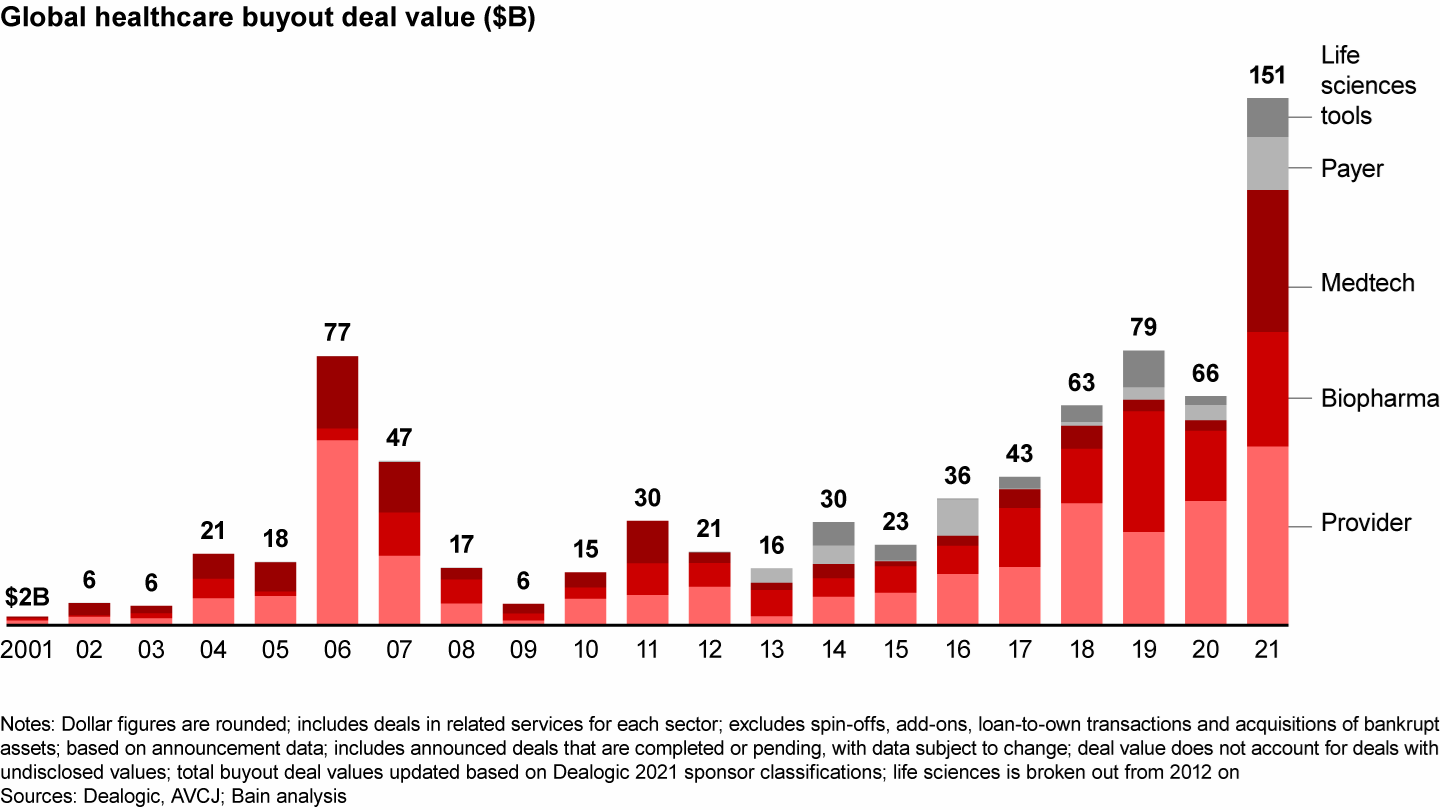Report

At a Glance
- Deals in life sciences tools deals nearly doubled to 34 in 2021, while disclosed deal value soared to a record $11.1 billion.
- The sector traditionally has attracted mostly corporate buyers, but expanding treatment and detection of infectious diseases has allowed more private equity investors to get their foot in the door.
- Consolidation of diagnostics labs held appeal, particularly in Asia-Pacific.
- R&D companies also presented pockets of opportunity, notably when the company is a clear leader in a growing market.
This article is part of Bain's 2022 Global Healthcare Private Equity and M&A Report
What a year for deals in the life sciences tools sector, for both buyouts and corporate mergers and acquisitions. The number of deals nearly doubled to 34 in 2021 from 18 the prior year, with most of the growth in Asia-Pacific and Europe (see Figures 1 and 2). Disclosed deal value soared to $11.1 billion from $2.4 billion. Indeed, there was so much life sciences activity that this year’s report breaks out the sector for the first time.
Deals in life sciences tools accelerated in 2021, especially in Asia-Pacific and Europe


Disclosed deal value surged to a record, buoyed mainly by medtech and payer acquisitions


Traditionally, life sciences assets have been most attractive for corporate buyers, but as the industry evolved to focus more on treatment and detection of infectious diseases, private equity investors have been able to get their foot in the door. They’ve primarily targeted tools and technologies used for therapeutic research and diagnostics.
The appeal of diagnostics
Diagnostic labs have proven to be reliable long-term investments, and in 2021 investors showed great interest in lab consolidators, particularly in Europe and Asia-Pacific, as well as companies that specialize in earlier disease detection. Covid-19 testing has provided significant cash flows; while testing volumes fluctuated as vaccinations rose, waves of Covid-19 variants are likely to require further interventions from these operators.
In this context, private equity firms have targeted clinical diagnostic providers. Two notable European deals were the EQT acquisition of Cerba HealthCare, a European lab and diagnostics provider, for $5.3 billion (an exit opportunity for Partners Group), and the Goldman Sachs, OMERS Infrastructure, and AXA purchase of Amedes Holding, a German-based operator of diagnostic laboratories. The Cerba and EQT partnership already started playing out its strategy by announcing the add-on acquisition of Viroclinics–DDL. In Asia, notable activity included Catterton Management’s $181 million investment in the Japanese company PHC Holdings. Specialty diagnostics firms also stepped up their investments, such as ArchiMed’s acquisition of Zyto Group, a fully integrated cancer diagnostic test and equipment provider for clinical pathology labs.
Pockets of value in R&D
Life sciences R&D companies historically appealed more to corporate buyers, but now private equity firms have started to find pockets of opportunity. Sponsors are finding value in early growth investments where the company is a clear leader in a growing market. This logic underpins Vitruvian Capital’s investment in MaxCyte, which offers electroporation technology. Another example is ArchiMed’s investment in 42 Life Sciences, a developer and producer of reagents for immunohistochemistry, which is part of the Zyto Group.
Corporate buyers continue to pursue acquisitions as they complement their therapeutic portfolios, which should continue to provide meaningful exit opportunities for sponsor-backed companies. For example, PerkinElmer, which focuses on diagnostics, research, and industrial testing, bought BioLegend, a provider of antibodies and reagents for research, for $5.25 billion.
Lab equipment raises its profile
As drug development and research advances, lab equipment has become more attractive for investors. Key deals in 2021 included Carlyle’s acquisition of Unchained labs, a life sciences tool company and provider of biotechnology solutions, from Novo Holdings for $435 million; Altaris’s purchase of a majority stake in Solesis, specializing in biomaterials for life sciences companies; and the acquisition by Adelis Equity Partners of Nordic Biosite, a distributor of diagnostic and life sciences products.
Three themes for the near future
Looking ahead, risks will vary widely for life sciences investments. We expect three themes to stand out.
First, diagnostics providers will continue to expand as hospitals and other care facilities increasingly outsource testing services, and as direct-to-consumer testing ramps up.
Second, life sciences firms will benefit from using technology, such as mRNA, that aids development and testing components.
Finally, capital was directed last year toward miniaturizing, automating, and digitally integrating workflows in the lab setting, primarily through growth-equity investments. These investments will fuel the formation and maturation of integrated lab services companies that will attract even greater investor interest in the years to come.